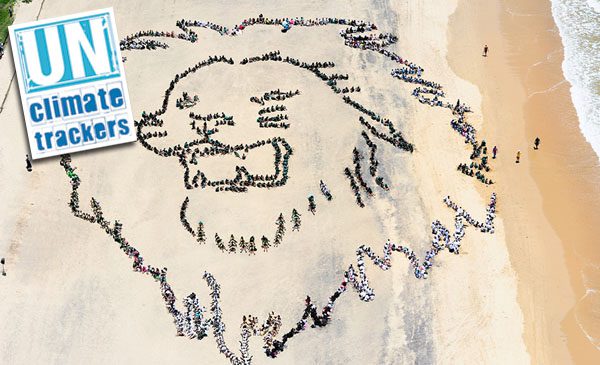
Reverend Tafue Lusama knows a thing or two about the urgency to tackle climate change. Living in Tuvalu, he has seen the climate changing over the last twenty years. Rising sea levels, storm surges and ocean acidification have had devastating impacts of people’s culture, livelihoods and ability to grow food. A few months ago, Tafue and his family almost ran out of fresh water. Prolonged drought plunged the small island nation into a state of emergency. Schools shut down and bottled water had to be flown in from Australian and New Zealand.
At this year’s UN Climate Summit in Durban, South Africa, Tafue is representing his country, population eleven thousand. Having lived the experiences of changing weather patterns and extreme weather events, Tafue is calling for urgent action to tackle climate change.
With just over two days to go, there is a clear coalition of ambition forming here in Durban. The European Union, Least Developed Countries (comprising many African nations) and the Alliance of Small Islands States (AOSIS) are all calling for urgent action to increase ambition and put the brakes on runaway climate change. These countries also want to see the Kyoto Protocol continue with stronger environment safe guards and transparency and the elements of the Cancun agreements implemented.
Today the E.U. stated that they were committed to looking into increasing their emission reduction targets next year. Denmark, which takes control of the E.U. presidency next, has committed to reduce emissions by 40% by 2020 as has Germany.
Contrasting this coalition of ambition, are other countries like the US, who is responsible for 18% of the world’s emissions, continue to block progress on attempts to limit warming to the below 2 degree target set in Copenhagen. The recent UN Environment Programme report sets out the gap between countries current pledges and what is needed to meet the below 2 degree target set at Copenhagen.
Today, AOSIS made the sensible suggestion that developed countries acknowledge the ‘gigatonne gap’. Their proposal involves a plan for countries to address the gap and includes a ministerial meeting in early 2012. This was a bright ray in a dark day here at the talks.
Australia and other developed countries need to join this coalition of ambition and urgently move to the higher end of their current 2020 pledges. Whilst developing countries also need to clarify what support they need to meet their targets.
This morning, thousands of young people gathered to form a lion roaring for their government to act.
The cost of acting now is far less than the cost of not acting. Delaying action will cost money and lives. As Reverend Tafue Lusama says “climate change is a matter of life and death”.
Clancy Moore is blogging from the UN Climate Summit in Durban, South Africa (November 28 – December 9) as part of Oxfam’s UN Climate Tracker project.
Photo: Courtesy Shayne Robinson for Greenpeace & SpectralQ